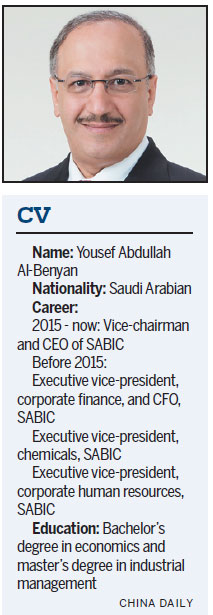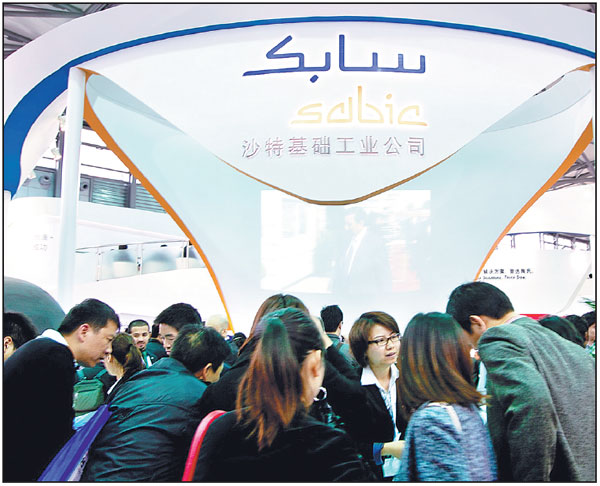Technical edge offers key to innovative solutions
Petrochemicals firm SABIC plans to leverage advanced polycarbonate technology, focus on high-quality chemical products
SABIC, the Middle East's largest petrochemicals company headquartered in Riyadh, Saudi Arabia, said it will continue investing in the Chinese market with a new polycarbonate plant in Tianjin under construction.
As the Chinese government continues to protect foreign investments to better ensure investors' rights, SABIC vows to take advantage of its technical edge to focus on high-quality chemical products, leveraging the company's advanced polycarbonate technology.
The Chinese market is becoming increasingly attractive to foreign multinationals as China's economy matures, and we are committed to the Chinese market, it said.
|
Visitors gather at the booth of SABIC during a plastics and rubber industry exhibition in Shanghai. Provided to China Daily |
While it continues to deepen energy cooperation with old partners, the company plans to seek new partnerships for sustainable development in the future.
In an interview with China Daily, Yousef Abdullah Al-Benyan, vice-chairman and CEO of SABIC, shared his thoughts on China's policy on foreign enterprises and foreign investment, and its plans for local business development.
What progress has China made in streamlining government functions to raise efficiency?
SABIC has cooperated with the Chinese government on multiple projects and is impressed by its efficiency and enthusiasm toward them. These include a memorandum of understanding signed with the Administration Committee of Guangzhou Nansha Development Zone in Guangzhou at the end of 2017 and recently, an investment MoU with Fujian provincial government for a petrochemical project in Fujian province.
By cutting red tape, shortening the negative list on market entry, helping companies obtain business permits earlier as well as many other efforts, the government is building a far more attractive investment environment and showing its commitment to further opening-up.
This will allow international enterprises to collaborate deeply with local businesses and import our expertise and experience, benefiting local communities. Lubricating the cogs that power this process will be truly beneficial for China in the long run, and will benefit the economy throughout Asia.

How has the ongoing supply-side reform changed the nation's economic growth and your company's business in China?
We are optimistic about the direction the Chinese government is driving its economy. SABIC is in a strong position to collaborate with Chinese customers and partners to create innovative solutions tailored for the Chinese market across the entire value chain, including key industries like packaging, automobiles, construction and consumer electronics.
We are at the heart of China's economic transformation. China is a key driver of SABIC's growth strategy with sustained investment in Asia and globally. We are proactively responding to China's call to achieve quality growth through our differentiated material solutions and continuous investment in China, notably the recent investment MoU with Fujian provincial government for a world-scale petrochemical project and excellent progress with Sinopec toward working on new investment in our existing joint venture Sinopec SABIC Tianjin Petrochemical Co Ltd - running a world-class petrochemical complex in Tianjin.
What's your view of China's policy on foreign enterprises and foreign investment? How can the country further improve its business environment for foreign investors?
Easing market entry in China is vital if foreign-funded enterprises are to operate in more sectors. By increasing the efficiency of its services and cutting red tape, notably the advance on the legislation of Foreign Investment Law, it is expected that China's foreign investment environment will be vastly improved. Foreign investors' rights will be better secured, enhancing cross-regional collaboration. As further reform and opening-up measures roll out, we expect to see a dramatic increase in prosperity for the Chinese market and renewed interest in investment from foreign enterprises.
How has innovation changed China's economic development and your company's business in China?
China is currently transitioning to an innovation driven model, moving further up the value chain and aiming for higher innovation and quality. As a growth partner for China, this has been positive for SABIC.
China is a key platform for SABIC's future growth, from differentiated products to R&D. SABIC sees technology and innovation as an important element in realizing our 2025 strategy, we continue to invest in research that will strengthen SABIC's competitive position, optimize feedstock utilization, and reduce costs.
We have the SABIC Technology Center Shanghai, which opened in 2013, focusing on developing next-generation innovative technologies and solutions to help our customers address some of the most pressing issues in China and the region across major industry sectors. We also have a strategic partnership with the Chinese Academy of Sciences and the Dalian Institute of Chemical Physics, highlighting our commitment to continuous open innovation, helping to advance the betterment of society and modern living in China.
How can China achieve more sufficient and sustainable economic development?
Last November, President Xi Jinping made a commitment to lower China's import tariffs, institute stronger protection for intellectual property, and move toward a consumer-led economy - commitments that we in the business community highly applaud and believe are definitely the right path for China to achieve more sufficient and sustainable economic development.
The Chinese market has been a key pillar of our business over the past 30 years, and China also is a key driver and central to our SABIC 2025 strategy. We are optimistic in the direction the Chinese government is driving its economy. SABIC is in a strong position to create innovative material solutions tailored for the Chinese market across the entire value chain. We look forward to an increasingly transparent business environment and appreciate the government's willingness to open up further.
Assisting in the quest of moving China toward a new era by enabling innovation within the country through strategic partnerships and shared ambitions that drive sustained economic development, SABIC is actively enabling the Belt and Road Initiative as well as Saudi Vision 2030, contributing to an increasingly close-knit global community.
How do you see China's role in promoting globalization and multilateral trade? What's your view of trade protectionism?
As the world stands at the crossroads of immense change, global economic landscapes are changing rapidly and the old ways are no longer sufficient to meet today's needs. This underscores the critical fact that cross-regional cooperation is more essential than ever before in generating and maintaining sustainable and inclusive growth.

To embrace the more connected world on the horizon, we are committed to leveraging SABIC's considerable global resources and expertise to seize opportunities, jointly meet challenges and chart the right course for globalization for China and our international partners.
Despite the challenges presented by free trade, we cannot escape inclusive globalization. The world economy is like a giant ocean that lies all around us. To survive and thrive in the global economy, we must all have the courage to swim in that ocean - and find the appropriate means to overcome these challenges.
The benefits of a global economy far outweigh the costs. Here in China we have the Belt and Road Initiative and back at home in Saudi Arabia we have Saudi Vision 2030, we have seen the increasing synergy in our close-knit global community.
zhengxin@chinadaily.com.cn
(China Daily Global 05/31/2019 page9)



















